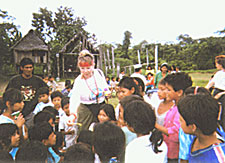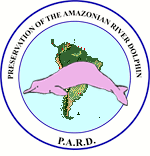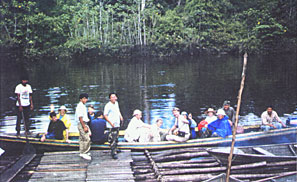Statement of Purpose
INTERNATIONAL SOCIETY for the Preservation of the Tropical Rainforest Statement of Purpose
The International Society for the Preservation of the Tropical Rainforest (ISPTR) is an American and Peruvian non-profit organization which is comprised of a dedicated team of volunteer naturalists. One of our international projects is the Preservation of the Amazonian River Dolphin (PARD). For more than one decade, we have been working on the frontlines of the Amazon Basin in Peru and Brazil, developing a series of innovative pilot projects and sustainable alternative strategies that will benefit the indigenous people, fauna and flora of the world’s largest remaining tropical rainforest.
Accomplishments
ISPTR/PARD has made significant progress in shaping positive environmental attitudes and developing beneficial educational/conservation programs. Some of our accomplishments are:
TRUSTED by the Peruvian government, in 1990, Roxanne was given the honor of being the first woman to ever raise the Peruvian national military flag and light the Eternal Flame of Peace in the Plaza de Armas in Iquitos, Peru. Also, Ms. Kremer was awarded the Medal of Honor from the Navy, Army, Airforce and the Pro-Marina association. She was the fifth woman in Peru and the first non-Peruvian “gringa” ever to receive this honor.
OPENED an outpost medical clinic at our Peruvian research camp on the Yarapa River which is visited by doctors from the Naval Hospital in Iquitos. The outpost clinic is manned by their administrative nurse.
SIGNED an agreement with the National University of the Peruvian Amazon in Iquitos, Florida International University and Ohio State University for accredited courses and exchange programs involving our research camp which is a “living classroom”.
ASSISTED the people living along the Yarapa River in setting up sustainable cooperatives based on the production of pink dolphin carvings made from ever-plentiful balsa wood (balsa wood will not deplete the forests). Since then they have begun selling baskets, beautiful jewelry and art work.
COLLECTED and distributed thousands of dollars worth of medicine by boat and on foot to many remote villages in response to the cholera epidemic. Compiled census data following the epidemic. Informed and educated the people regarding the replication of a simple remedy for cholera.
PROVIDED the means for local people to receive medical treatment for snake and scorpion bites, broken limbs, dengue fever, etc.. This sometimes took the form of transporting medical emergencies to the nearest hospital, over two and one-half hours away, by boat.
STOPPED the illegal selling of 75 huge trees that had been cut from the mouth of the Yarapa River in 1992, and had a large fine imposed on the illegal commercial logger by bringing the Department of Agriculture and the Forest Police to the scene.
PARTICIPATED as an accredited non-government organization (NGO) at the Earth Summit Conference in Rio de Janeiro, Brazil (June 1992). ISPTR organized and transported 54 Brazilian Kayapo Indians to Riocentro (the main site of the Earth Summit Conference). They arranged one of the largest UNCED-related press conferences at the Earth Summit, so the Indians, who represented all indigenous cultures of the world, could state how a strong Forest Principles Treaty would be fundamental for the protection of the world’s forests and the traditional cultures they support.
LEARNED that commercial loggers had been given government contracts to cut down trees in the Cumaceba Community Reserve and along the Yarapa River.
After Ms. Kremer explained the environmental consequences of this logging operation, Arq. Raul Morey, the president of Loreto, cancelled the contracts and suspended all commercial logging and commercial fishing activities within the Department of Loreto, until a new set of forestry principles could be drafted. ISPTR assisted by submitting a comprehensive list of recommendations to the Regional Government of Loreto.
SET UP and taught how to build, with the assistance of a Swedish University, an improved sanitation/sewage system on the Yarapa River through the use of compost toilets.
ORGANIZED AND LED a research team to the Cayobeno Faunal Reserve in Ecuador at the invitation of the Ecuadorian government. They compiled census data plus behaviorial and feeding patterns on the pink dolphins (inia geoffrensis) while they mapped the Lagarto River at the request of the Equadorian government. ESTABLISHED the first river dolphin preserve on the Amazon River.
POSTED tributaries to prevent illegal gill-net fishing by commercial fishermen.
COMPLETED a 14-minute video on the plight of the river dolphins, the rainforest and the indigenous people. The film has been shown on Brazilian and Peruvian television to raise awareness of the need to protect the Amazon’s ecosystem.
DEVELOPED an animal rehabilitation/orphanage and reintroduction program at our 300-acre non-invasive research camp that handles indigenous surplus zoo animals and animals that have been confiscated from poachers by the Forest Police. After completing the rehabilitation program, the animals will be released into the natural habitat of the 4000-acre private wildlife sanctuary.
CELEBRATED (since 1988), on the third Sunday of every June, The International Dedication Days for the Dolphins and Ecology in Peru which includes ecological messages, art contests for children and parades. during the celebration of our 5th Dedication Day in Iquitos, Roxanne Kremer and children from Peru and America burned confiscated animal skins to demonstrate that the animals are more valuable alive than dead. This annual practice has continued, with much ceremony and support from the local people.
TOOK CARE OF five dolphins at the request of the Brazilian government, for over eight years, including the administering of vitamins and antibiotics as needed. The two pink dolphins (Inia geoffrensis) and three tucixi grey dolphins (Sotalia fluviatilis) lived in two Brazilian lakes, which constituted a Species Survival Sanctuary. In July of 1994 ISPTR/PARD working with the Brazilian national agency, IBAMA, began a three to six month program designed to reintroduce them back to their natural habitat.
HELD the first river dolphin conference in Brazilia, and PARD’s influence resulted in a change of laws regarding dolphins and whales.
STOPPED the killing of 400 minke whales off the coast of Brazil that had been targeted by Japanese whalers for “scientific research”. Some of the whales were pregnanat. Note: since 1986, the Brazilian whaling industry has ceased!
COLLECTED AND DISTRIBUTED

Roxanne and the river people
thousands of pounds of donated clothing, medicine and educational materials among Indians and river people. Roxanne always has something to give to or teach about the rainforest. (Right)
SUPPORTED numerous orphans outside of Iquitos, Peru.
SIGNED a convenien (an agreement) of cooperation with the Regional Government of Loreto, the largest department, or “state”, in Peru whose size is approximately 100,000 square miles.
ORGANIZED AND LED a team of doctors to a remote tribe of Machiguenga Indians who were dying from diseases contracted by contact with the outside world. Many lives were saved.
ISPTR/PARD was founded on the premise that one person CAN make a difference and a group of like-minded people can exert a positive influence on the fate of our rainforests. We can no longer afford to ignore our INDIVIDUAL AND COLLECTIVE RESPONSIBILITIES as planetary stewards. Our actions and decisions must now be guided by a new ethical standard which can address the needs of all peoples while respecting the rights of other living creatures which share this planet with us.
“We are all interconnected as if one beating cell. Kill a part of that cell and the whole cell eventually dies. By the year 2000 A.D., more that one million species will have become extinct on Earth.”
Reach Us
Contact
pard_expeditions@yahoo.com


